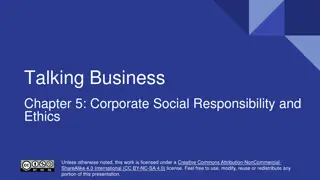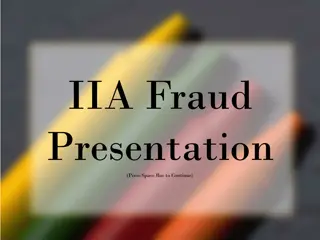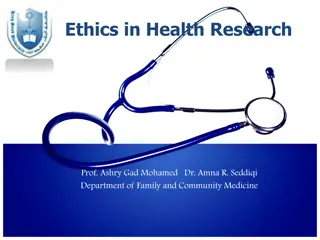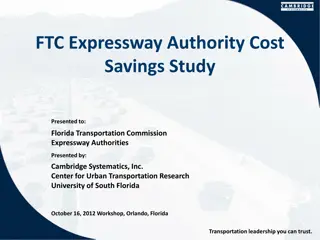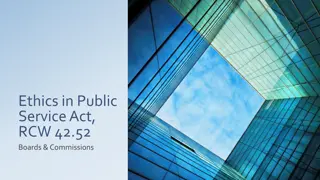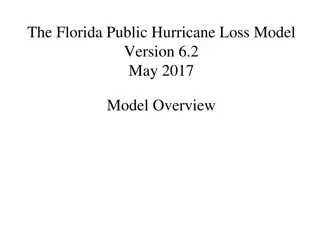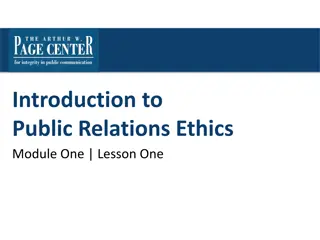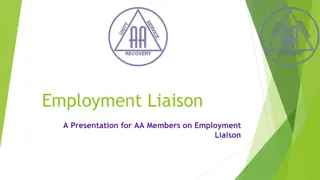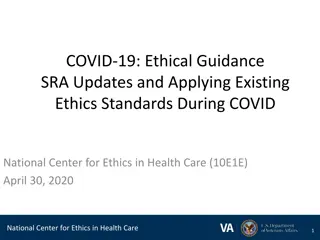Ethical Standards for Public Officers in Florida
The content discusses the ethical standards and codes of conduct for public officers and employees in Florida, emphasizing the importance of maintaining public trust and preventing conflicts of interest. It highlights the regulations in place, such as the Code of Ethics and the Sunshine Amendment, to ensure accountability and transparency in government practices.
Download Presentation

Please find below an Image/Link to download the presentation.
The content on the website is provided AS IS for your information and personal use only. It may not be sold, licensed, or shared on other websites without obtaining consent from the author. Download presentation by click this link. If you encounter any issues during the download, it is possible that the publisher has removed the file from their server.
E N D
Presentation Transcript
Ralph: When she put two potatoes on the table, one big one and one small one, you immediately took the big one without asking me what I wanted. Norton: What would you have done? Ralph: I would have taken the small one, of course. Norton: You would? Ralph: Yes, I would. Norton: So, what are you complaining about? You got the small one! 1
Florida Clerks of Court and Comptrollers Public Position and Public Records Winter Conference Jacksonville, Florida January 30, 2014 2
Public virtue is a kind of ghost town into which anyone can move and declare himself sheriff. Saul Bellow, American novelist (b. 1915) 3
Ethics in Florida The Florida State Constitution was revised in 1968 to require that a code of ethics for public officers and employees be prescribed by law to prohibit conflict between public duty and private interests. The Sunshine Amendment, adopted in 1976, provides additional constitutional guarantees concerning ethics in government. For enforcement, it requires an independent commission to investigate complaints concerning breaches of public trust by public officers and employees. 4
Code of Ethics Part III, Chapter 112, F.S., is the Code of Ethics for Public Officers and Employees Promote the public interest and maintain the respect of the people for their government Ensure that public officials conduct themselves independently and impartially, not using their offices for private gain other than compensation provided by law In 1974, the Legislature created the Commission on Ethics to serve as guardian of the standards of conduct for state and local public officials. 5
Prohibitions and Reporting Florida's ethics laws contain two types of provisions: Those prohibiting certain actions or conduct Those requiring that certain disclosures be made to the public 6
A quick analytical tool Who s glad? How glad? Who s mad? How mad? 7
Misuse of Public Position Public administrators should be held to a higher standard than others. s. 112.313(6), F.S. 8
Misuse of Public Position No public officer ... Shall corruptly use or attempt to use his or her official position or any property or resource which may be within his or her trust, or perform his or her official duties, to secure a special privilege, benefit, or exemption for himself, herself, or others s. 112.313(6), F.S. 9
Misuse of Public Position More than just bad behavior corruptly engaging in conduct inconsistent with the proper performance of your duties; AND knowing that the conduct is wrong; AND intending to gain a personal privilege, benefit, or exemption. 10
Nineteenth Statewide Grand Jury From the First Interim Report, December 17, 2010: We recommend criminalizing misuse of public position under F.S. 112.313 (6). Currently, misuse of public position is only a violation under the code of ethics. Based on testimony, we make recommendations to revise this section and make it applicable both civilly under the Code of Ethics and criminally under Chapter 838. The term corruptly should be removed from misuse of public position as a civil ethical violation under Chapter 112. . . . The wrongful acts of an official using his or her public position to secure a benefit should be a civil violation, whether done corruptly or not. . . . . . . It appears other states have criminalized similar misuse of public position violations while Florida only makes this an ethical violation. 11
Inside Information Current and former officers and employees Personal gain or benefit Information not available to the public and gained by reason of your official position Statutory exemptions are provided for: Information relating exclusively to governmental practices Use of general expertise or skill s. 112.313(8), F.S. 12
Chieftains must understand that the spirit of the law is greater than its letter. Attila the Hun, leader of the Hunnic Empire (434-453) 13
Public Records Anything, in any format, that is intended to PERPETUATE, COMMUNICATE, or FORMALIZE knowledge Even if it is not in "final form" 14
Public Records New in 2013 Exemption: Names of spouses and children of active or former sworn or civilian law enforcement personnel, state attorneys/statewide prosecutors and assistants, DCF personnel who investigate criminal activities, DOH personnel who support the investigation of child abuse or neglect, and DOR or local government personnel engaged in revenue collection CSE Exemption: Complaints of misconduct against an agency employee and information obtained in an investigation while investigation is active Agency contracts for services must include specified provisions requiring the contractor to comply with public records laws 15
Public Records - Notes Public employees notes to themselves which are designed for their own personal use in remembering certain things do not fall within the definition of public record. But they may also have to meet the test that they are not intended to perpetuate, communicate, or formalize knowledge. The use of portions of the notes to generate another document to be distributed would indicate that the notes are public records. A memorandum prepared by a city commissioner after a meeting with a former city official, summarizing details of what was said and containing alleged factual information about possible criminal activity, was a public record subject to disclosure. A court determined that the memorandum was not a draft or a note containing mental impressions that would later form a part of a government record, but rather formalized and perpetuated his final knowledge gained at the meeting. 16
Public Records - E-mail In evaluating whether a record is made or received in connection with the official business of an agency, the determining factor is the nature of the record, not its physical location. Personal e-mails between government employees on government-owned computers which were not made or received in the course of official business do not constitute public records. Similarly, the mere fact that an e-mail is sent from a private e- mail account using a personal computer is not the determining factor as to whether it is a public record; it is whether the e-mail was prepared in connection with official agency business and intended to perpetuate, communicate or formalize knowledge of some kind. 17
Judicial records Relying on separation of powers principles, Florida courts have held that the judiciary is not an agency for purposes of Ch. 119, F.S. The judiciary, as a coequal branch of government, is not an agency subject to supervision or control by another coequal branch of government. However, the Florida Supreme Court has expressly recognized that both civil and criminal proceedings in Florida are public events and that it will adhere to the well established common law right of access to court proceedings and records. The 2nd DCA has stated: [W]e recognize that the press has a general right to access of judicial records. Public access to judicial branch records is set out in Fla. R. Jud. Admin. 2.420. 18
Reasonable conditions Section 119.07(1)(a), F.S., establishes a right of access to public records: Every person who has custody of a public record shall permit the record to be inspected and copied by any person desiring to do so, at any reasonable time, under reasonable conditions, and under supervision by the custodian of the public records. The term reasonable conditions as used in s. 119.07(1)(a), F.S., refers not to conditions which must be fulfilled before review is permitted but to reasonable regulations that would permit the custodian of records to protect them from alteration, damage, or destruction and also to ensure that the person reviewing the records is not subjected to physical constraints designed to preclude review. A policy requiring a physical address for mailing copies of requested public records or the personal appearance of the requestor would not appear to relate to the custodian s duty to protect public records from alteration or destruction, but to impose additional constraints on the requestor. 19
Requestors Further, the law provides any member of the public access to public records, whether he or she be the most outstanding civic citizen or the most heinous criminal. [A]s long as the citizens of this state desire and insist upon open government and liberal public records disclosure, as a cost of that freedom public officials have to put up with demanding citizens even when they are obnoxious as long as they violate no laws. Even though a public agency may believe that a person or group are fanatics, harassers or are extremely annoying, the public records are available to all of the citizens of the State of Florida. The 4thDCA ruled that a defendant s conduct in making over 40 public records requests concerning a victim constituted a legitimate purpose, and thus cannot violate the stalking law because the right to obtain the records is established by statute and acknowledged in the state constitution . 20
Requestors interest The motivation of the person seeking the records does not impact the person s right to see them under the Public Records Act. [G]enerally, a person s motive in seeking access to public records is irrelevant. [T]he fact that a person seeking access to public records wishes to use them in a commercial enterprise does not alter his or her rights under Florida s public records law. 21
Physical custody An agency that received records from a private entity in the course of official business and did not make copies of the documents could not return them to the entity following receipt of a public records request. A court ordered the agency to demand the return of the records from the private entity so they could be copied for the requestor. A court found that both a city and a private entity violated the Public Records Act when the city avoided taking possession of negotiation documents reviewed and discussed by both parties and instead left them with the private entity s attorney. Records on private entity s secure website that were viewed and used by a state university in carrying out its official duties were public records even though the university did not take physical possession. 22
Requests in writing There is no requirement in the Public Records Act that requests for records must be in writing. A custodian must honor a request for copies of records that is sufficient to identify the records desired, whether the request is in writing, over the telephone, or in person, provided that the required fees are paid. If a public agency believes that it is necessary to provide written documentation of a request for public records, the agency may require that the custodian complete an appropriate form or document; however, the person requesting the records cannot be required to provide such documentation as a precondition to the granting of the request to inspect or copy public records. But, a request for records of the judicial branch must be in writing. Rule 2.420(i)(1), Fla. R. Jud. Admin. A person requesting access to or copies of public records may not be required to disclose his or her name, address, telephone number or the like to the custodian, unless the custodian is required by law to obtain this information prior to releasing the records. 23
Attorneys fees 119.12 Attorney s fees. If a civil action is filed against an agency to enforce the provisions of this chapter and if the court determines that such agency unlawfully refused to permit a public record to be inspected or copied, the court shall assess and award, against the agency responsible, the reasonable costs of enforcement including reasonable attorneys fees. 24
How long do you have? The custodian of public records or his or her designee is required to acknowledge requests to inspect or copy records promptly and to respond to such requests in good faith. Section 119.07(1)(c), F.S. The Public Records Act, however, does not contain a specific time limit (such as 24 hours or 10 days) for compliance with public records requests. The Florida Supreme Court has stated that the only delay in producing records permitted under Ch. 119, F.S., is the limited reasonable time allowed the custodian to retrieve the record and delete those portions of the record the custodian asserts are exempt. Standing requests. Nothing in the Public Records Act appears to require that an agency respond to a standing request for production of public records that it may receive in the future. 25
County records maintained by the Clerk Pursuant to s. 125.17, F.S., the clerk of the circuit court serves as the ex officio clerk to the board of county commissioners. Records maintained by the clerk which relate to this function (e.g., county resolutions, budgets, minutes, etc.) are public records which are subject to the copying fees set forth in Ch. 119, F.S., and not the service charges set forth in Ch. 28, F.S. Documents such as minutes of public meetings, which are in the custody of the clerk as ex officio clerk of the board of county commissioners, are not subject to the $1.00 per page charge prescribed in Ch. 28, F.S. When members of the public use their own photographic equipment to make their own copies, the clerk is not entitled to the fees prescribed in s. 28.24, F.S., but is entitled only to the supervisory service charge in s. 119.07(4)(e)2., F.S. 26
Public Records - Costs In the normal course of business, most of the service charges you will impose are capped at the amounts specified in s. 28.24, F.S. The cost of providing electronic copies of information in a computer database will be determined based on the provisions of Ch. 119, F.S. 27
Public Records - Service charge Section 119.07(4)(d), F.S. states that if the nature or volume of public records to be inspected or copied requires the extensive use of information technology resources or extensive clerical or supervisory assistance, or both, the agency may charge a reasonable service charge based on the cost actually incurred by the agency for such extensive use of information technology resources or personnel. The statute does not define the term extensive. In 1991, the 1st DCA upheld a hearing officer s order rejecting an inmate challenge to a DOC rule that defined extensive as requiring more than 15 minutes to locate, review for confidential information, copy and refile the requested material. The 2nd DCA approved a county s similar formula for calculating its special service charge. The Attorney General has stated that it may be prudent for agencies to define extensive in a manner that is consistent with the purpose and intent of the Public Records Act and that does not constitute an unreasonable infringement upon the public s statutory and constitutional right of access to public records. 28
Public Records - Costs An agency is not ordinarily authorized to charge for the cost to review records for statutorily exempt material. However, the special service charge may be imposed for this work if the volume of records and the number of potential exemptions make review and redaction of the records a time-consuming task. A 2ndCircuit opinion stated it would not be unreasonable in these types of cases [involving many documents and several different exemptions] to charge a reasonable special fee for the supervisory personnel necessary to properly review the materials for possible application of exemptions. The 2nd DCA approved a county s special service charge which included an employee s salary and benefits in calculating the labor cost , but ruled that the charge must be reasonable and based upon the actual labor costs incurred by or attributable to the county. A 9th Circuit opinion concluded that an agency could charge only a clerical rate for the time spent making copies, even if due to staff shortages, a more highly paid person did the work. 29
Deposit (advance payment) Section 119.07(4)(a)1., F.S., states that the custodian of public records shall furnish a copy or a certified copy of the record upon payment of the fee prescribed by law According to one court, a city was authorized to require the payment of an advance deposit under the facts of this case before proceeding with the effort and cost of preparing the voluminous copies requested by the plaintiff. The Attorney General has opined that a custodian is authorized to bill the requestor for any shortfall between the deposit and the actual cost of copying the public records when the copies have been made and the requesting party subsequently advises the city that the records are not needed. An agency may refuse to produce additional records if the fees for a previous request for records have not been paid by the requestor. 30
Public Records - No charge You may not add overhead costs such as utilities or other office expenses to the charge for public records. You may not charge for travel time to obtain public records stored off-premises. You may not assess fees designed to recoup the original cost of developing or producing the records. 31
Public Records - Retention Department of State Frequently Asked Questions: http://dlis.dos.state.fl.us/recordsmgmt/rm_faq.cfm#2 Department Webinar Training: Email: RMTraining@DOS.MyFlorida.com Telephone: Tim Few (850) 245-6746 Roger Sockman (850) 245-6745 32
Is ethical public service a contradiction in terms? . . . ethics of compliance: tell me what is right, what is wrong, what is legal, what is not permissible; if there is anything free from blame, if there is any security from accusation, tell me about these things so that I can be judged an ethical public servant. Louis C. Gawthrop, Public Service and Democracy, 1998, p. 153 33











